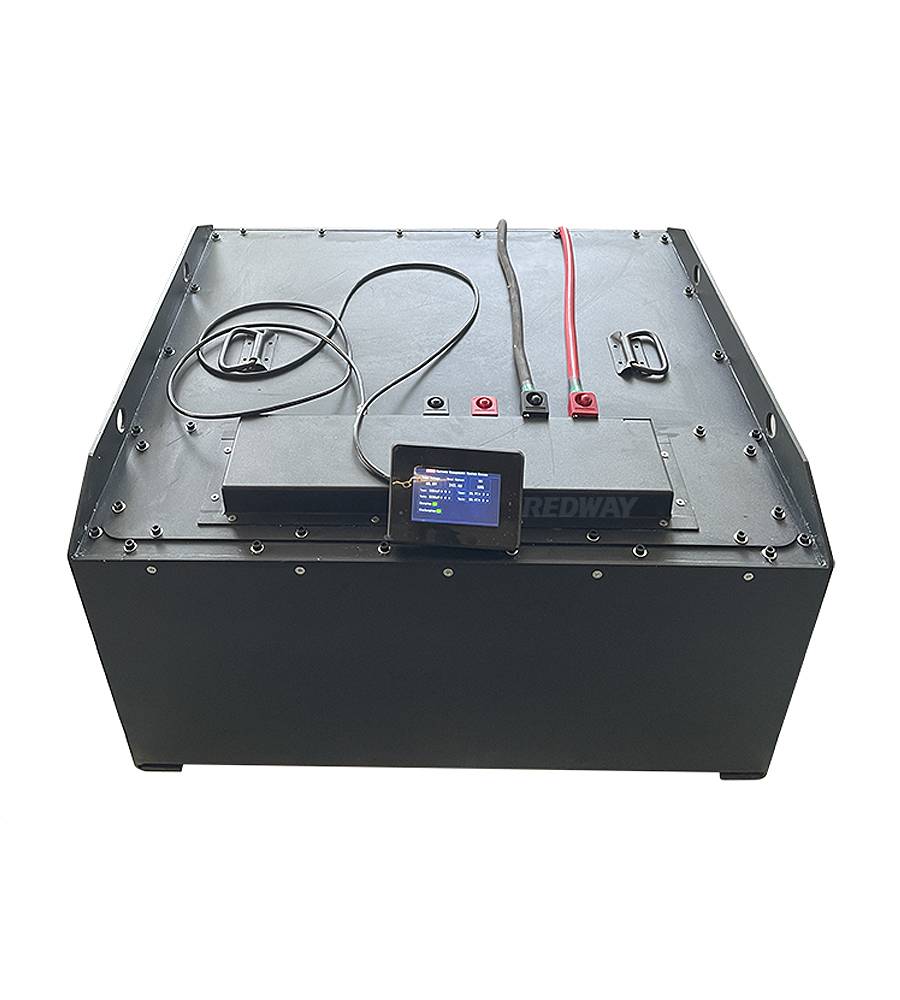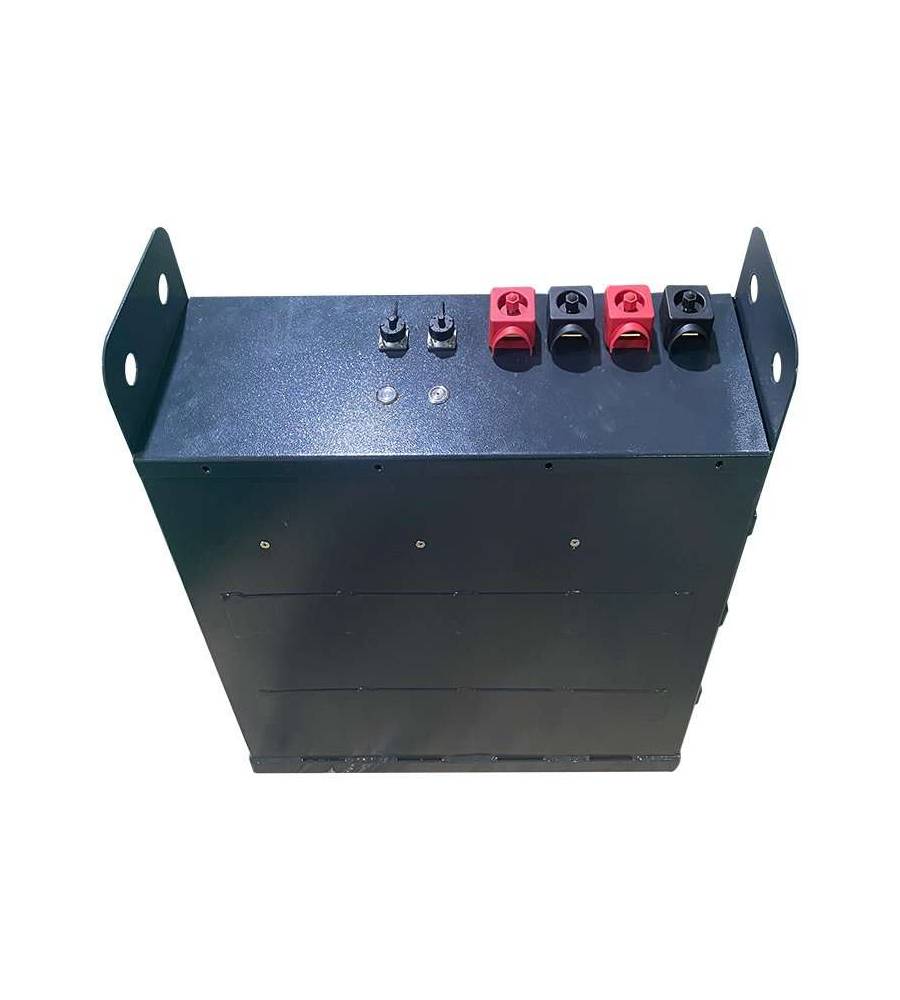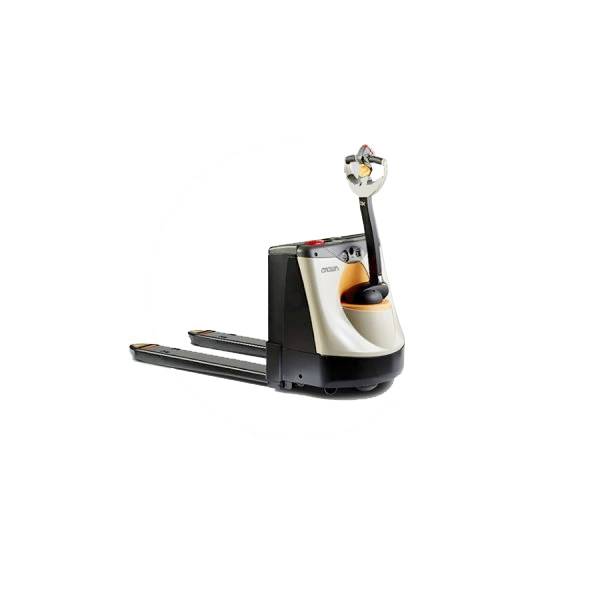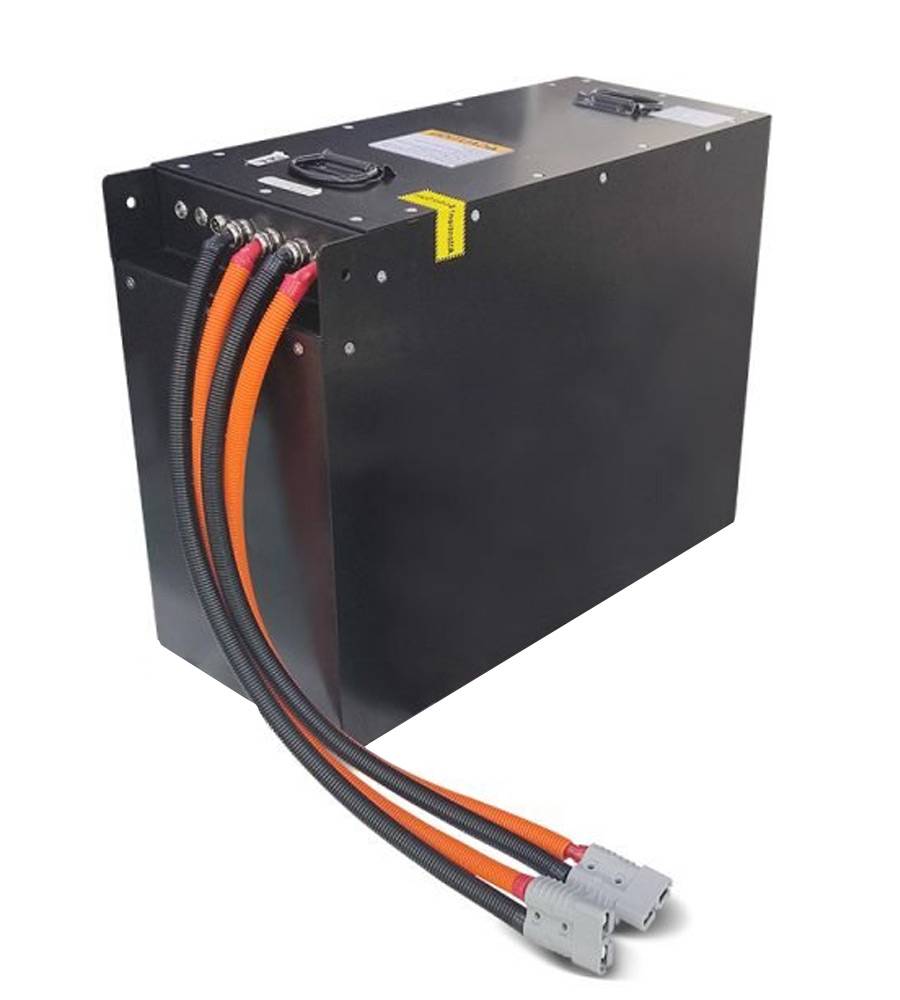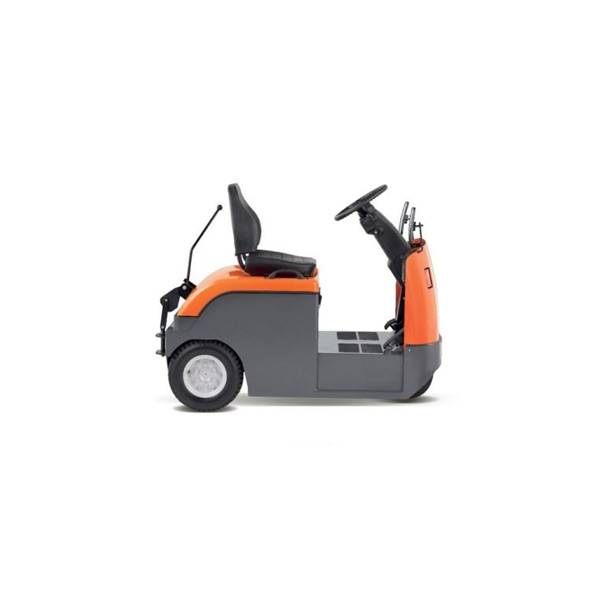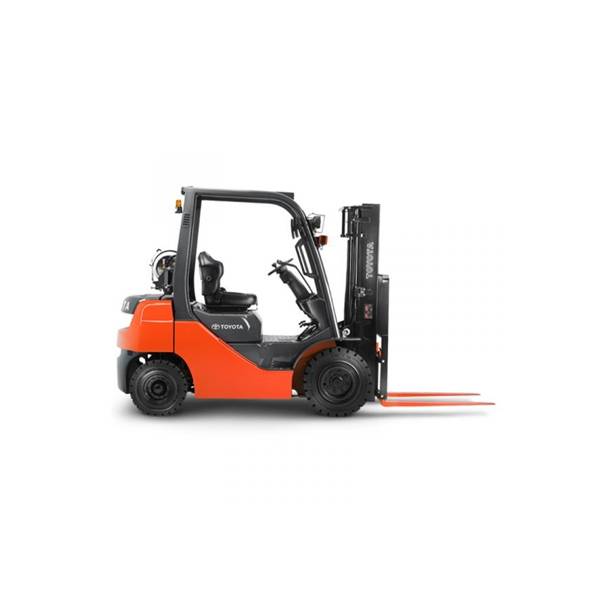LiFePO4 Forklift Batteries OEM Factory
LiFePO4 Forklift Batteries OEM, One-Stop Solution
Redway leads globally in manufacturing LiFePO4 Forklift Batteries, renowned for their high energy density, making them ideal for compact forklift spaces. Their efficient design allows for maximum energy storage in limited areas. LiFePO4 Forklift Batteries also boast a lower risk of thermal runaway, enhancing safety in specific applications.
Our expert team guides you in selecting the optimal LiFePO4 Forklift Battery design, utilizing appropriate manufacturing processes. As a lithium battery manufacturer for OEM applications, Redway specializes in customizing LiFePO4 Forklift Batteries, supporting your branding with logo, design, size, and specifications customization.
Best LiFePO4 Forklift Batteries Manufacturer 2024
What is the wholesale price of lithium battery?
You can click contact us or phone call us. We will give you multiple options of price.
Is Redway Power a trading company or factory?
Redway Power is a company with its own factory, integrating research, development, production, and sales.
How about the quality of Redway's LiFePo4 Battery product?
Redway Power boasts over 12 years of experience in LiFePO4 battery production and is an authorized supplier for CATL and BYD.
Can you do an OEM/ODM project?
Yes, we have engineers available to assist in designing and developing any related products.
What’s your MOQ?
MOQ varies according to battery voltage and capacity.
What payment terms can we accept?
We accept TT/Paypal/West Union, etc.
LiFePO4 Forklift Batteries Knowledge
Discover the knowledge about LiFePO4 forklift batteries. These batteries are renowned for their durability, longevity, and high cycle life. With a typical design life of over 10 years and more than 3500 cycles, LiFePO4 forklift batteries outperform lead-acid batteries and provide exceptional performance and reliability.
What is Needed to Handle LiFePO4 Forklift Batteries?
To handle LiFePO4 forklift batteries safely and effectively, several factors should be considered. Proper education and training on battery handling and maintenance are essential to ensure safe practices. These batteries can be heavy, requiring the use of appropriate lifting equipment. Regular cleaning of battery terminals and monitoring for dirt and corrosion buildup is important for optimal performance. Understanding the correct charging procedures and voltage range is crucial to maximize battery lifespan and performance.
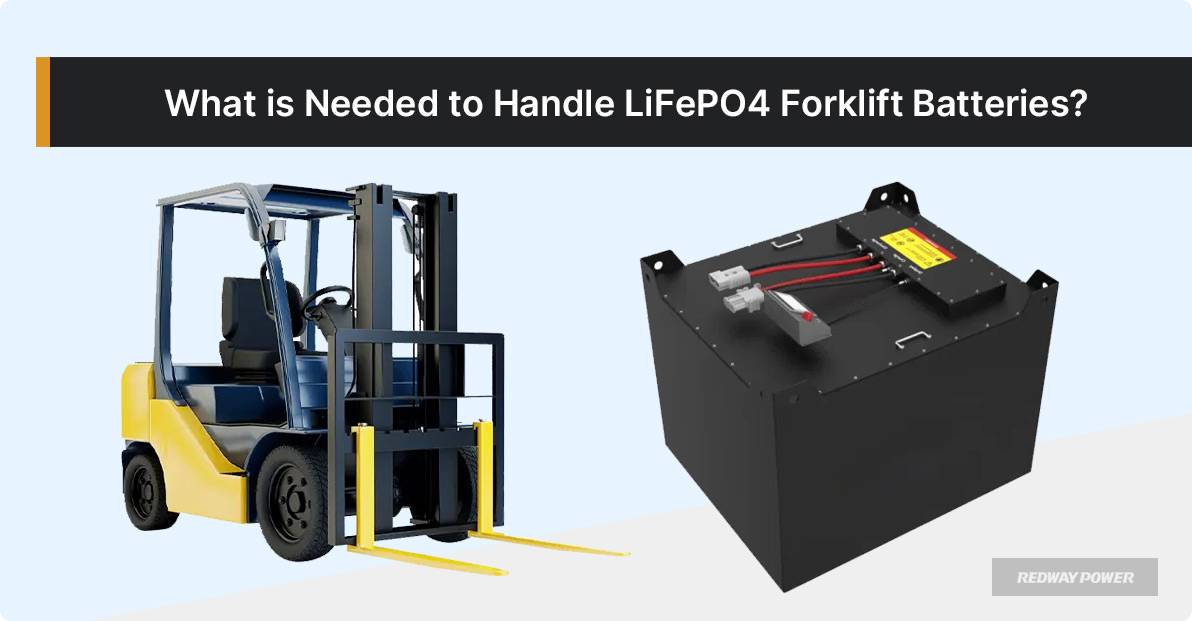
- Education and Training: Proper education and training on battery handling and maintenance are crucial for safe practices.
- Lifting Equipment: LiFePO4 forklift batteries can be heavy, necessitating the use of appropriate lifting equipment for safe handling.
- Terminal Maintenance: Regular cleaning of battery terminals and monitoring for dirt and corrosion buildup is important for optimal performance.
- Charging Procedures: Understanding the correct charging procedures and voltage range is essential to maximize battery lifespan and performance.
What is the Life Expectancy of a Forklift LiFePO4 Battery?
- Long Design Life: LiFePO4 forklift batteries have a typical design life of over 10 years, indicating their durability and longevity.
- More than 3500 Cycles: These batteries can provide more than 3500 cycles, allowing for extended use and performance.
- Three Times Longer than Lead-Acid: LiFePO4 batteries can last over 3 times longer than lead-acid batteries, offering superior lifespan.
- Influencing Factors: Actual life expectancy may vary based on usage, maintenance, and operating conditions.
How Often Should You Replace a Forklift LiFePO4 Battery?
The life expectancy of a LiFePO4 forklift battery is typically longer than that of a lead-acid battery. LiFePO4 forklift batteries can last between 2,000 and 3,000 cycles, offering extended usage compared to lead-acid batteries. However, the actual replacement frequency of a LiFePO4 forklift battery can vary depending on factors such as usage patterns, maintenance practices, and operating conditions. Regular monitoring of battery performance and proper care can help maximize the lifespan of a LiFePO4 forklift battery.
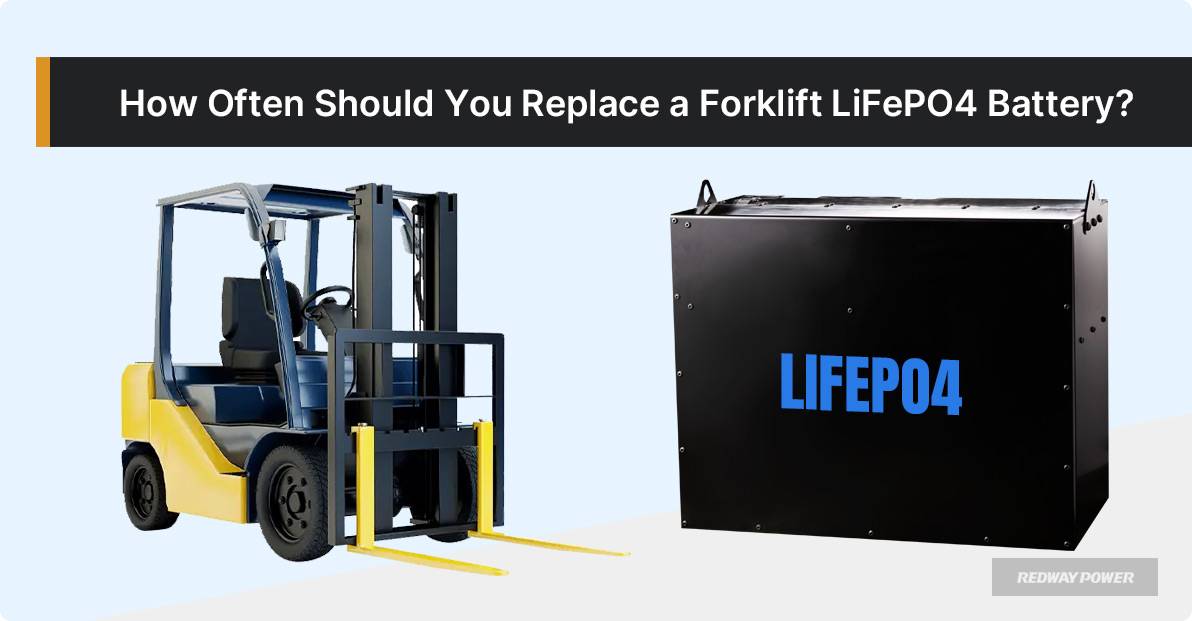
- Longer Lifespan: LiFePO4 forklift batteries typically last between 2,000 and 3,000 cycles, surpassing the lifespan of lead-acid batteries.
- Factors Influencing Replacement: The actual replacement frequency can vary based on factors such as usage patterns, maintenance practices, and operating conditions.
- Extended Usage: Proper care and maintenance can help maximize the lifespan of a LiFePO4 forklift battery, ensuring extended usage and performance.
What is the Correct Order to Charge a LiFePO4 Forklift Battery?
- CCCV Charging Method: Use the CCCV (constant current, constant voltage) charging method for LiFePO4 forklift batteries.
- Constant Current Charge: Begin with a constant current charge at a recommended rate of 0.3C.
- Constant Voltage Charge: Transition to a constant voltage charge at 3.65 volts.
- Optimal Charging Efficiency: The CCCV charging method ensures efficient and effective charging, maximizing battery lifespan and performance.
Is it Safe to Operate a Forklift with a Low-Charged LiFePO4 Battery?
Operating a forklift with a low-charged LiFePO4 battery is generally safe due to the inherent safety features of LiFePO4 batteries. These batteries have a stable chemical makeup and a high thermal runaway temperature, significantly reducing the risk of fire and overheating. LiFePO4 batteries offer a lower risk of safety incidents compared to other battery chemistries when operated with a low charge. However, it is important to monitor the battery’s state of charge and ensure it is properly charged before use to maintain optimal performance and prevent unexpected shutdowns during forklift operation.
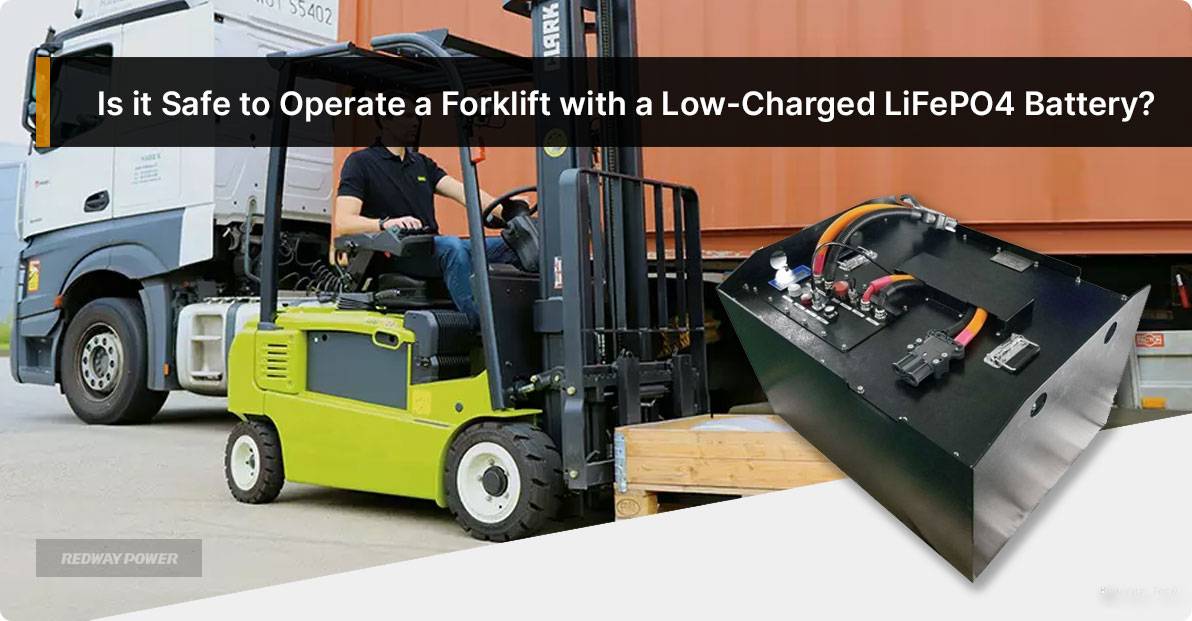
- Stable Chemical Makeup: LiFePO4 batteries have a stable chemical makeup, reducing the risk of fire and safety incidents.
- High Thermal Runaway Temperature: These batteries have a high thermal runaway temperature, minimizing the risk of overheating.
- Lower Risk Compared to Other Chemistries: LiFePO4 batteries offer a lower risk of safety incidents when operated with a low charge.
- Proper Charging: It is important to monitor the battery’s state of charge and ensure it is properly charged before use to maintain optimal performance and prevent unexpected shutdowns.
Can You Overcharge a LiFePO4 Forklift Battery?
Overcharging a LiFePO4 forklift battery is not safe and can result in battery damage and safety risks. LiFePO4 batteries are sensitive to overcharging, which can cause excessive heat buildup and damage the battery cells. To prevent overcharging, it is important to use a charger specifically designed for LiFePO4 batteries and follow the manufacturer’s recommended charging guidelines. Regular monitoring of the battery’s state of charge and adherence to proper maintenance practices are crucial to ensure safe and optimal performance of LiFePO4 forklift batteries.
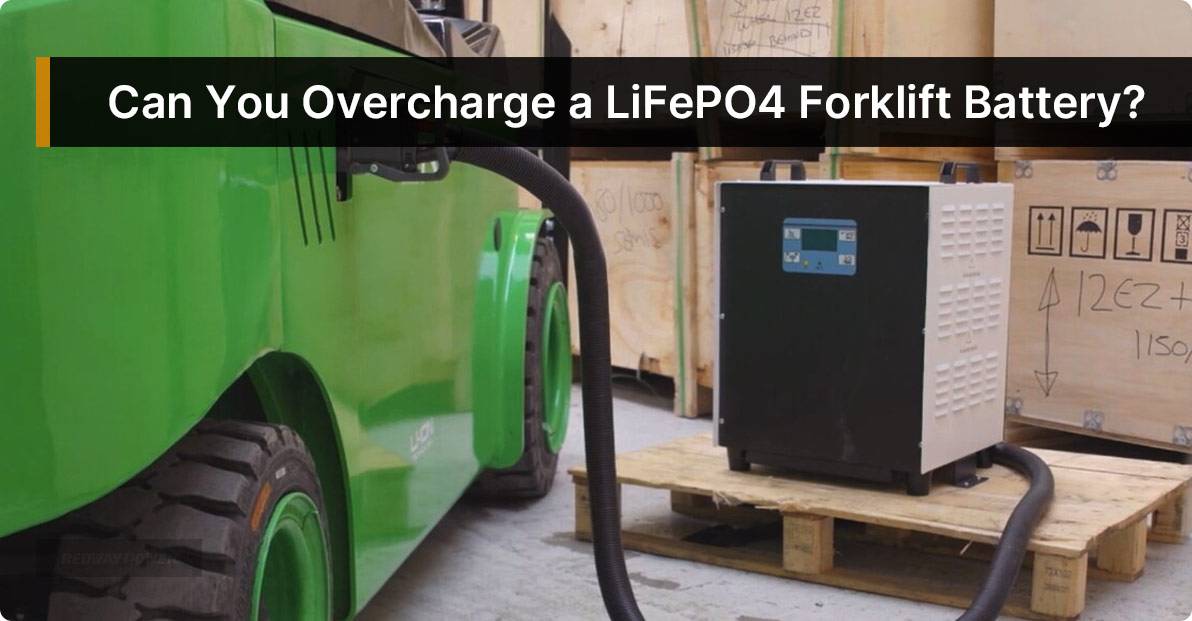
- Safety Risks: Overcharging a LiFePO4 battery can result in safety risks and damage to the battery.
- Excessive Heat Buildup: Overcharging causes excessive heat buildup, which can damage the battery cells and shorten their lifespan.
- Charger Compatibility: It is important to use a charger specifically designed for LiFePO4 batteries to prevent overcharging.
- Recommended Charging Guidelines: Following the manufacturer’s recommended charging guidelines ensures safe and optimal performance.
- Regular Monitoring and Maintenance: Regular monitoring of the battery’s state of charge and proper maintenance practices are essential for safe and efficient operation.
What are the advantages and considerations of using lithium-ion batteries in forklifts?

- Advantages:
- High Energy Density: Lithium-ion batteries have a higher energy density, resulting in longer runtimes and increased productivity for forklifts.
- Rapid Charging: Lithium-ion batteries can be charged at faster speeds, reducing charging time and increasing operational uptime.
- Minimal Maintenance: Lithium-ion batteries require minimal maintenance compared to lead-acid batteries, resulting in reduced downtime and lower maintenance costs.
- Cold Temperature Performance: Lithium-ion batteries maintain their capacity better in cold temperatures, making them suitable for operations in cold environments.
- Considerations:
- Initial Cost: Lithium-ion batteries have a higher upfront cost compared to lead-acid batteries. However, their long-term benefits and performance often outweigh the initial investment.
- Safety Considerations: Proper handling and storage practices should be followed to ensure the safe use of lithium-ion batteries.
How do electric forklift batteries differ from traditional forklift batteries?
- Maintenance:
- Lithium-ion batteries require less maintenance compared to traditional lead-acid batteries commonly used in forklifts.
- They do not require regular watering or equalization, reducing maintenance efforts and costs.
- Charge Rate:
- Lithium-ion batteries have a faster charge rate compared to lead-acid batteries, allowing for shorter charging times and increased operational uptime.
- This enables electric forklifts to be charged quickly, contributing to improved productivity.
- Lifespan:
- Lithium-ion batteries have a longer lifespan compared to lead-acid batteries.
- They can endure a higher number of charge and discharge cycles without significant degradation, resulting in a longer service life for the battery pack.
- Energy Efficiency:
- Lithium-ion batteries are more energy-efficient compared to lead-acid batteries, providing higher energy density.
- This higher energy efficiency allows for longer runtimes and increased productivity for electric forklifts.
Where can I buy forklift batteries?
- Battery Suppliers and Manufacturers:
- Battery suppliers and manufacturers specialize in providing batteries, including forklift batteries, and may have online platforms or physical stores where you can make a purchase.
- These suppliers offer a variety of options, including different voltages and capacities, to meet your specific forklift battery needs.
- Industrial Equipment Suppliers:
- Suppliers of industrial equipment, including forklifts, often have departments or divisions dedicated to providing batteries for forklifts.
- These suppliers may offer forklift batteries as part of their product offerings, allowing you to conveniently purchase batteries along with other forklift-related equipment.
- Online Retailers:
- Online marketplaces and retailers, such as Amazon and eBay, provide a platform for sellers to offer forklift batteries for sale.
- These platforms offer a range of options, both new and used, allowing you to compare prices and choose the best option for your needs.
- Local Dealers and Distributors:
- Local dealers and distributors of forklifts and related equipment may have forklift batteries available for purchase.
- These dealerships and distributors may have physical locations where you can inquire about and purchase the batteries, providing personalized assistance and support.
What are the benefits of using lithium-ion forklift batteries?

- Energy Efficiency:
- Lithium-ion forklift batteries are more energy-efficient compared to lead-acid batteries, providing higher energy density.
- This results in longer runtimes and increased productivity for electric forklifts.
- Faster Charging:
- Lithium-ion batteries charge faster than lead-acid batteries, reducing charging time and increasing operational uptime.
- This allows for minimized downtime and improved efficiency during demanding work schedules.
- Extended Lifespan:
- Lithium-ion forklift batteries typically have a longer lifespan, lasting two to four times longer than lead-acid batteries.
- This reduces the frequency of battery replacements, resulting in cost savings and improved overall efficiency.
- Higher Performance:
- Lithium-ion batteries maintain a higher, more stable voltage over the course of a shift, resulting in higher forklift performance and productivity.
- This consistent power delivery enhances operational efficiency and ensures reliable performance.
What is the price range for forklift truck batteries?
- New Forklift Batteries:
- New forklift truck batteries typically range from around $2,000 to $6,000 or more, depending on factors such as voltage, capacity, and brand.
- Prices may vary based on the specific requirements of the forklift and the desired battery specifications.
- Used Forklift Batteries:
- Refurbished or used forklift batteries are available at a lower cost compared to new batteries, typically costing around 50% less.
- The price of used batteries depends on factors such as the condition, age, capacity, and brand.
- Additional Costs:
- It’s important to consider additional costs such as battery chargers, maintenance equipment, and installation expenses.
- These additional costs may vary based on the specific requirements of the forklift and the battery system.
How long does a forklift battery typically last?
- Lead-Acid Batteries:
- A standard lead-acid forklift battery typically lasts for about 1,500 charging cycles, equivalent to around five years in a single-shift operation with proper maintenance.
- This lifespan may vary based on factors such as maintenance practices, charging cycles, and usage patterns.
- Lithium-Ion Batteries:
- Lithium-ion forklift batteries generally have a longer lifespan compared to lead-acid batteries, lasting between 2,000 and 3,000 charging cycles.
- Proper maintenance and care are crucial in optimizing the lifespan and performance of lithium-ion forklift batteries.
- Maintenance and Care:
- Regular maintenance practices, including watering, cleaning, and equalization, are essential in prolonging the lifespan of forklift batteries.
- Following manufacturer guidelines and best practices can help optimize battery performance and ensure its longevity.
What are the advantages of using lithium-ion batteries in electric fork trucks?
- Energy Efficiency:
- Lithium-ion batteries are more energy-efficient compared to lead-acid batteries, resulting in lower energy bills and increased operational efficiency.
- They can be up to 30% more energy-efficient, contributing to cost savings and reduced environmental impact.
- Faster Charging:
- Lithium-ion batteries charge significantly faster than lead-acid batteries, reducing charging time and increasing operational uptime.
- They can charge up to 8 times faster, minimizing downtime and maximizing productivity.
- Extended Lifespan:
- Lithium-ion batteries have a longer lifespan compared to lead-acid batteries, lasting two to four times longer.
- This extended lifespan reduces maintenance and replacement costs, resulting in cost savings over time.
- Reduced Downtime:
- With faster charging and longer runtimes, lithium-ion batteries contribute to reduced downtime, allowing for increased productivity and efficiency.
- This reduced downtime translates to improved operational performance and optimized workflow.
- Environmental Friendliness:
- Lithium-ion batteries are more environmentally friendly compared to lead-acid batteries. They do not contain hazardous materials and have a lower carbon footprint.
- This environmental friendliness aligns with sustainability goals and reduces the impact on the environment.
What are the steps involved in changing a forklift battery?

- Preparing to Remove the Old Battery:
- Use appropriate forklift battery-changing equipment and ensure the forklift is in the correct position and turned off.
- Take necessary precautions to ensure a safe working environment.
- Removing the Old Battery:
- Follow proper lifting and handling procedures to safely remove the old battery.
- Disconnect the battery cables and any additional connections according to manufacturer guidelines.
- Handling and Disposing of the Old Battery:
- Adhere to safety guidelines for handling and disposing of the old battery, which may include wearing protective clothing and using designated disposal areas.
- Follow local regulations and environmentally responsible practices.
- Installing the New Battery:
- Carefully position the new battery into place using proper lifting techniques.
- Reconnect the battery cables and any additional connections, ensuring secure and proper connections.
- Post-Installation Checks:
- Double-check all connections to ensure they are secure and properly tightened.
- Perform any necessary post-installation tests to verify the proper functionality of the new battery.
What are the different types of powered industrial trucks that use traction batteries?
- Electric Counterbalance Forklifts:
- These forklifts are commonly used in warehouses and manufacturing facilities.
- They are powered by traction batteries and are designed with a counterweight at the rear for load balancing.
- Reach Trucks:
- Reach trucks are specialized forklifts designed for narrow aisle operations.
- They utilize traction batteries for power and have extendable forks to reach high racking.
- Order Pickers:
- Order pickers are used for picking individual items from shelves or racks.
- These forklifts are equipped with a platform that can be raised to the desired height and powered by traction batteries.
- Electric Pallet Jacks:
- Electric pallet jacks, also known as walkie pallet jacks, are used for short-distance pallet movement.
- They are powered by traction batteries and operated by a pedestrian.
- Electric Stackers:
- Electric stackers are used for stacking and retrieving pallets at various heights.
- These stackers rely on traction batteries for their operation.
- Electric Tow Tractors:
- Electric tow tractors are used for towing loads within a facility.
- They are powered by traction batteries and commonly employed in airports, distribution centers, and manufacturing plants.
Are there any specific considerations when purchasing a used forklift battery?
- Warranty Coverage:
- Consider the warranty coverage offered for the used forklift battery, as it provides assurance and protection in case of any issues.
- A comprehensive warranty can provide peace of mind and safeguard against unexpected expenses.
- Compatibility:
- Ensure that the used battery is compatible with the forklift’s specifications, including voltage and size.
- Compatibility with the forklift’s battery compartment and electrical system is essential for proper functioning.
- Capacity:
- Consider the capacity of the used battery and ensure it meets the specific requirements of the forklift and its intended applications.
- The capacity should be suitable for the workload and operational demands of the forklift.
- Maintenance History:
- Inquire about the maintenance history of the used battery to understand its previous usage and maintenance practices.
- A well-maintained battery is likely to offer better performance and longevity.
- Counterweight Requirements:
- Verify if the used battery meets the counterweight requirements of the forklift for safe and optimal performance.
- The battery’s weight and dimensions should align with the forklift’s specifications.


